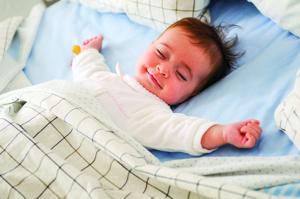Health
Expert Tips to Help Your Newborn Sleep Better and Safer

New parents often struggle with getting their newborns to sleep, but expert guidance can help. Melissa Abell-Bardsley, a registered nurse at Mass. General Brigham, has shared essential strategies for ensuring safe and effective sleep for infants. Her recommendations are based on guidelines from the American Academy of Pediatrics and are crucial for first-time parents navigating the challenges of early parenthood.
Understanding Safe Sleep Practices
Creating a safe sleep environment is vital for newborns. Abell-Bardsley emphasizes the importance of the ABCs of safe sleep: A for Alone, B for Back, and C for Crib. These principles guide parents in reducing the risk of Sudden Infant Death Syndrome (SIDS) and other sleep-related hazards. Placing babies on their backs to sleep, ensuring they sleep alone in a safety-approved crib, and avoiding soft bedding or toys are key components.
Abell-Bardsley notes that the first year of life is critical, as infants are most vulnerable to SIDS between the ages of 1 month and 1 year. Parents are encouraged to adhere strictly to these guidelines, which have been shown to significantly lower the risks associated with infant sleep.
Establishing a Calming Bedtime Routine
In addition to safety measures, establishing a calming bedtime routine can greatly enhance a baby’s ability to fall asleep. Abell-Bardsley suggests creating a consistent schedule that includes calming activities such as gentle rocking, reading a short story, or singing lullabies. These routines help signal to the baby that it is time to sleep, fostering a sense of security and comfort.
Dim lighting, a quiet environment, and a comfortable room temperature can also promote better sleep. Abell-Bardsley recommends keeping the nursery at a temperature between 20°C and 22°C (68°F to 72°F) to ensure optimal comfort.
Parents should also be aware of their baby’s sleep cues. Signs of sleepiness can include rubbing eyes, yawning, or fussiness. Responding promptly to these cues can prevent overtiredness, which can make it more difficult for the baby to settle down.
While every baby is unique, these expert recommendations can provide a solid foundation for improving sleep quality for both infants and their parents. For those seeking additional support, consulting with pediatricians or certified sleep consultants can offer personalized advice tailored to individual circumstances.
In conclusion, implementing the ABCs of safe sleep and establishing a calming bedtime routine can significantly enhance a newborn’s sleep experience. By following these guidelines, parents can create a safer and more peaceful sleeping environment for their little ones.
-

 Technology5 months ago
Technology5 months agoDiscover the Top 10 Calorie Counting Apps of 2025
-

 Health2 months ago
Health2 months agoBella Hadid Shares Health Update After Treatment for Lyme Disease
-

 Health3 months ago
Health3 months agoErin Bates Shares Recovery Update Following Sepsis Complications
-

 Technology4 months ago
Technology4 months agoDiscover How to Reverse Image Search Using ChatGPT Effortlessly
-

 Technology1 month ago
Technology1 month agoDiscover 2025’s Top GPUs for Exceptional 4K Gaming Performance
-

 Technology2 months ago
Technology2 months agoElectric Moto Influencer Surronster Arrested in Tijuana
-

 Technology5 months ago
Technology5 months agoMeta Initiates $60B AI Data Center Expansion, Starting in Ohio
-

 Technology5 months ago
Technology5 months agoRecovering a Suspended TikTok Account: A Step-by-Step Guide
-

 Health4 months ago
Health4 months agoTested: Rab Firewall Mountain Jacket Survives Harsh Conditions
-

 Lifestyle5 months ago
Lifestyle5 months agoBelton Family Reunites After Daughter Survives Hill Country Floods
-

 Technology4 months ago
Technology4 months agoHarmonic Launches AI Chatbot App to Transform Mathematical Reasoning
-

 Technology3 months ago
Technology3 months agoUncovering the Top Five Most Challenging Motorcycles to Ride





















